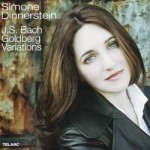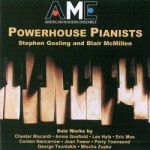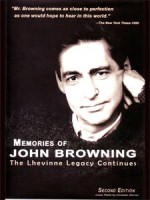Column Name
Title
It’s hard to ignore the freight train of hype surrounding Juilliard alumna Simone Dinnerstein’s remarkable traversal of Bach’s "Goldberg" Variations (Telarc 80692), but I’m happy to hop on. Parallels are inevitable with Glenn Gould, who in 1955 rocketed to classical music stardom with the very same work. But where Gould woke up listeners with some often speed-demon tempos (not to mention that hum!), Dinnerstein has a beguiling lack of pretense (not to be confused with anti-intellectualism).
Body
I found her ebullient Variations 8 and 10 (the Fughetta) particularly entrancing, surrounding the simplicity of number 9. In Variation 14 she finds sunlight, whose beams positively overflow later in the fleet Variation 20. Bach’s formal structure seems brilliantly lit, as if Dinnerstein had gently rinsed away any stray bits of dust to reveal luxurious colors. She wears her prodigious technique lightly, and by the time one reaches the final Aria, the distance she has come only makes one marvel. Recorded at the American Academy of Arts and Letters by Adam Abeshouse, the sound is up to Telarc’s high standards, each piquant note captured with pleasing clarity.
Powerhouse Pianists, the first release from the up-and-coming American Modern Ensemble (on its own label), features Blair McMillen (M.M. ’95, piano) and Stephen Gosling (B.M. ’93, M.M. ’94, D.M.A. ’00, piano) in an eclectic program of music from the last 25 years. McMillen offers a rarity right off the bat, with Chester Biscardi’s softly glittering Piano Sonata (1986), then completely changes direction with Lee Hyla’s stark Basic Training (1994) and Eric Moe’s Where Branched Thoughts Murmur in the Wind, a brief, delicate essay from 2000. He ends with Brooklyn, October 5, 1941, Annie Gosfield’s 1997 striking tribute to the Brooklyn Dodgers (played with baseballs and a mitt), in an unusual set delivered with tautness and finesse.
Gosling begins with George Tsontakis’s enigmatic Bagatelle from 1989, which at one point hovers over some very Brahmsian chords, followed by the darkly mysterious Episodes for Piano (1983-84) by Perry Townsend. Then Conlon Nancarrow bubbles into the mix with Tango? (1983), brimming with wit. The cascade of notes continues with Joan Tower’s 1994 Or Like a … an Engine, its stammering title from a John Ashbery poem, and Gosling really floors the gas pedal for E-Machines, a hyperactive jolt by David Rakowski. Finally come Mischa Zupko’s Five Études for Piano (2001), clearly influenced by Ligeti, and Gosling gives them a scientific accuracy, as if surveying their intricacies with a microscope. Engineer John Yannelli, capturing both pianists in the hall at Sarah Lawrence College, has given these dynamic artists a clear soundstage against which even the minutest details register in sharp focus.
Many great pianists derive their insight (not to mention technique) from influential teachers, and John Browning (1933-2003) seems to have been very lucky to have been matched with Rosina Lhévinne. In Salome Ramras Arkatov's heartfelt documentary, Memories of John Browning: The Lhévinne Legacy Continues (2001, Arkatov Productions), Browning and Arkatov reminisce outside Lhévinne's apartment near Juilliard's earlier uptown home, and later we see insightful footage from a 1964 Lhévinne master class. (Arkatov herself studied with Mme. Lhévinne at Juilliard, and devoted 15 years of her life to producing The Legacy of Rosina Lhévinne, an award-winning documentary that came out in 2003.) But the film’s core is a 1992 interview with Browning, who discusses everything from working with George Szell, to bench posture, to matter-of-fact explanations of shoulder, hand, and finger positions to achieve the best results. The camera zooms in as Browning describes the Russian “flat-fingered technique,” using the pads of the fingers (rather than the bony tips) to produce more appealing tone. And it’s hard not to chuckle when he describes his tendency to channel Lhévinne by imitating her voice.
Additional fond remembrances come from his sister, Elizabeth, and colleagues Martin Canin, David Dubal, Marilyn Horne, Steven Mayer, Leonard Slatkin, and John Williams. Perhaps most illuminating are two students, Mira Armij Gill, shown coaching some of her own youngsters, and Benjamin Martin, whose touching letter of tribute is included in the disc’s extras. The soundtrack includes excerpts from Beethoven, Schumann, Barber’s Piano Concerto (with which Browning is most strongly identified), plus complete (and stunning) performances of Rachmaninoff’s Prelude, Op. 32, No. 5, and Chopin’s Nocturne, Op. 27, No. 2.







